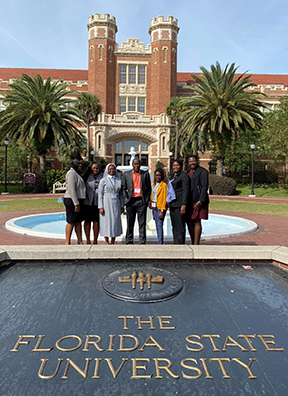CCAP Has Broadened Foreign Perspectives On Community College Systems For A Decade
By Larissa Martins, LSI Communications Assistant
The Community College Administrator Program (CCAP) is a six-week study program for higher education administrators from post-secondary vocational and technical institutions. Funded by the U.S. Department of State and administered by the Learning Systems Institute (LSI) at Florida State University (FSU) in partnership with Santa Fe College, this people-to-people exchange program aims to enhance international understanding of U.S. community college systems while fostering positive and collaborative relations between the United States and other countries.
"CCAP is a professional exchange and professional development program," stated LSI's Dr. Jeffrey Milligan. "It provides professionals and policymakers with exposure to new ideas, new experiences, new ways of approaching common challenges, and from that, we hope they will find some things useful in their own work."
"One of the most profound impacts of this program on me has been seeing the transformative power of community colleges—how it gives people opportunities, changes lives, and impacts the communities they serve," Dr. Milligan said.
By partnering with nearly half of the community colleges in Florida, the CCAP showcased how different institutions implement innovative educational programs to meet local workforce demand. Santa Fe College (SFC) played a key role in hosting CCAP cohorts for a comprehensive two-week seminar, during which participants learned firsthand how a high-performing community college operates.
"I think Santa Fe is a stronger institution as a result of this program, and our students are better off as a result of this program," Santa Fe College President Dr. Paul Broadie II stated. "We've been able to partner with FSU to help advance the higher education landscape, not just locally but across the globe."
Each CCAP was specifically designed to cater to its demographic. An integral component of the program's success was that FSU and SFC faculty visited the country beforehand to lay the groundwork. These trips consisted of tours of facilities, meetings with ministry officials, and discussions with faculty and administrators from various vocational-technical schools.
"The purpose of those trips was to aid in the planning for the CCAP and to try to be responsive to the particular needs of each country," noted Dr. Milligan. "The idea was to try to understand what that country's priorities and interests were in this particular sector of education and also to give us a sense of what level of development they were at."
Former SFC Assistant Vice President for Academic Affairs and current LSI visiting associate in research, Dr. Vilma Fuentes, expanded on the importance of these assessment trips. "For all these programs, there were certain topics we had to address, but there's a very big difference between Indonesia, South Africa, and Ukraine from a political, social, and historical perspective, and their educational systems reflect that."
As the CCAP evolved, LSI and SFC faculty began returning to the home country after six to twelve months to conduct the sixth and final week of the program. This change sparked excitement among CCAP staff and participants for the eventual reunion, where they would assess and discuss the progress.
"Countries all over the world are recognizing the importance of career technical education," stated Dr. Milligan. "They recognize that they can't and don't need to send everybody to the university, as they want their economies to develop, especially technologically, they have to train a skilled workforce."
The CCAP benefits the global economy by broadening foreign perspectives on community college systems, and the projects already have transformative impacts abroad. For instance, members from the Egyptian cohort helped pass legislation to create new technological universities that enable students' mobility in acquiring Bachelor's, Master's, and Doctorate degrees.
Additionally, the second cohort from Ukraine succeeded in proposing legislation passed and signed by President Zelensky while LSI and SFC faculty were in Kyiv for the program's final week.
With over 300 CCAP alumni worldwide, the project's influence will continue to reverberate throughout educational systems for years to come.
"The partnership between Florida State University and Santa Fe College, along with all the other community colleges in the state, has been absolutely critical in implementing the CCAP," said Dr. Fuentes. "I'm very thankful to the U.S. Department of State, specifically the Bureau of Educational and Cultural Affairs, Office of Global Educational Programs, for entrusting us with this program for ten years." 
As the CCAP approaches its 10th anniversary, a three-day reunion in Washington D.C. is scheduled to celebrate its achievements this summer. CCAP faculty, alumni, and representatives of partner community colleges will gather at the Department of State. The event will feature collaboration with the Institute of International Education and EducationUSA representatives from several embassies around the world.
"One of the most profound impacts of this program on me has been seeing the transformative power of community colleges—how it gives people opportunities, changes lives, and impacts the communities they serve," Dr. Milligan said.
LSI has been at the forefront of developing innovative solutions that bridge theory and practice in education. For over 50 years, LSI has delivered systems that measurably improve the learning and performance of organizations and individuals here in Florida and globally. To learn more about LSI, please visit LSI.FSU.edu. To learn more about CCAP, please visit LSI.FSU.edu/ccap.
